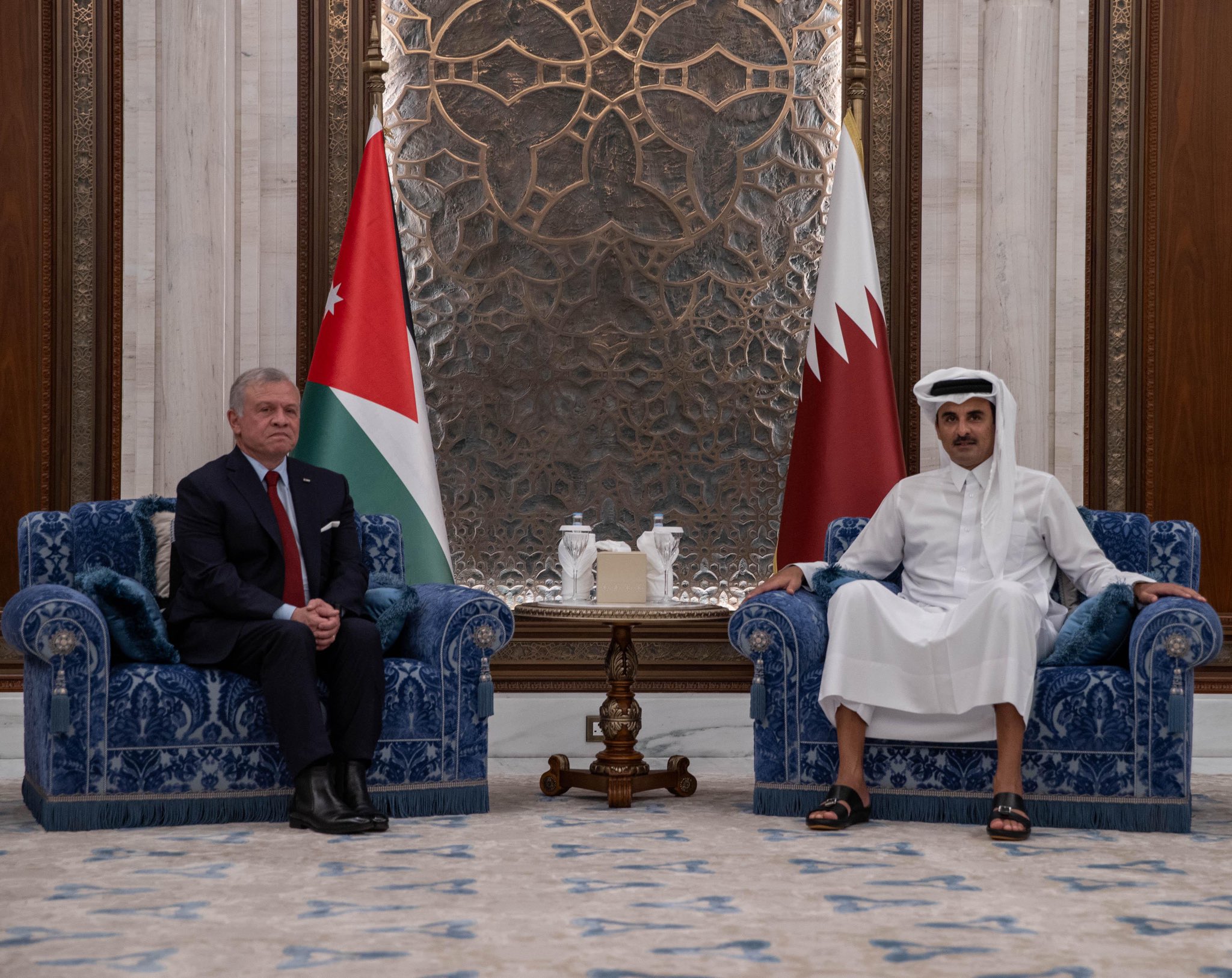Jordan said it immediately recalled its ambassador to Israel over the “unprecedented humanitarian catastrophe” in Gaza.
Qatar’s Amir Sheikh Tamim bin Hamad Al Thani and Jordan’s King Abdullah II called for international action in effectively reaching a ceasefire in Gaza during a meeting in Doha on Wednesday, as the devastating Israeli aggression nears one month.
The Qatari and Jordanian leaders met at the Lusail Palace during King Abdullah’s regional tour, in which he visited the United Arab Emirates and Bahrain.
Unlike Amman, Abu Dhabi, and Manama, Doha does not have diplomatic ties with Tel Aviv, though it has been at the forefront of mediations to de-escalate tensions and release captives held by Hamas, which runs a political bureau in Qatar.
During the meeting in Doha, Sheikh Tamim and King Abdullah “exchanged views on advancing regional and international diplomatic efforts to demand an immediate ceasefire” in Gaza, as per an Amiri Diwan statement.
“My brother, Abdullah II bin Al-Hussein, and I discussed developments in the situation in Gaza, and our joint diplomatic efforts to push for an immediate ceasefire, protect civilians, and open safe corridors to provide all necessary humanitarian aid,” Sheikh Tamim separately said in a post on X, formerly known as Twitter.
The Royal Hashemite Court (RHC) said in a statement that the Jordanian leader “warned against the expansion of the cycle of violence into the region” while stressing “that a military or a security solution will not succeed in resolving the Palestinian issue.”
“The King renewed Jordan’s rejection of attempts to forcibly displace the Palestinians in Gaza or cause their internal displacement. His Majesty commended Qatar’s positions towards the Palestinians, as well as its efforts, under the leadership of Sheikh Tamim, to coordinate with Arab countries and other stakeholders in working to stop the war and maintain calm,” the RHC added.
Jordan, together with Qatar, has been at the forefront of talks aimed at reaching a ceasefire in Gaza. On October 12, just days after Israel waged war on Gaza, King Abdullah held a phone call with Sheikh Tamim to discuss developments on the ground.
Amman recalls Tel Aviv envoy
The Hashemite Kingdom was the second in the Arab world to establish ties with Israel under the Wadi Araba Peace Treaty—named after the southern border crossing, which guarantees the former the restoration of its occupied areas of Al-Baqoura and Al-Ghumar.
Despite Amman’s ties with Tel Aviv, Jordan has appeared to take a tough stance against Israel since the beginning of its deadly war on Gaza on October 7.
On Wednesday, Jordan’s Foreign Minister Ayman Safadi “immediately” recalled its ambassador to Israel over the “unprecedented humanitarian catastrophe” in Gaza.
Amman added that it would only send back its envoy if Israel halts the onslaught and called on Tel Aviv to recall its ambassador to Amman. Israel had evacuated its embassies in Jordan as well as other countries that it shares ties with, including Bahrain and Morocco last week.
Jordan has seen impassioned protests over the last few weeks, most of which focusing on the Israeli and US embassies in the capital. Since the start of the war on October 7, Israel has killed at least 8,805 Palestinians, including 3,648 children.
Amman is also the host of a large population of Palestinians that were forcibly dispossessed in 1948 during the Nakba, or “catastrophe”, that marked the establishment of Israel. The Jordanian government fears a possible refugee crisis in the aftermath of the current Gaza war.
Mounting fears over regional war
King Abdullah’s Gulf tour also comes amid growing concerns over a potential spillover of violence across the region that could affect neighbouring Lebanon and Jordan.
Reuters reported a request by Jordan for Patriot air defence systems from the US to pump up its capabilities out of fears of being dragged into the war, especially with Iran and its proxies—namely Hezbollah in Lebanon and Yemen’s Houthis—entering the arena.
Recent reports have pointed to Jordan’s facilitation of Washington’s delivery of arms to Israel. However, the Jordan Armed Forces-Arab Army (JAF) refuted the claims in a statement on October 10 to Amman’s Petra news agency.
A JAF military source told Petra that the military aircraft mentioned only entered Jordan’s airspace “after obtaining the necessary overflight clearance”, noting that it was carrying only passengers and not equipment.
There have been major concerns on the American side, with its military in Iraq and Syria being targeted at least 23 times within just two weeks.
On October 21, the US said it would dispatch a Terminal High Altitude Area Defence (THAAD) system and Patriots to the Middle East, though it has not named the specific countries that would receive it.
On Sunday, the US declined plans to dispatch troops to Gaza to support Israel’s planned ground invasion of the Strip. Speaking to CBS on Sunday, US Vice President Kamala Harris maintained that Washington is only providing military consultations and equipment to Tel Aviv.
The Israeli occupation forces (IOF) have been attempting to advance militarily in Gaza over the past two weeks under its plans to wage a full ground invasion into the Strip.
Hamas fighters have been battling the IOF’s attempts to enter Gaza through several areas, killing 17 Israeli soldiers, the largest such figure in years.
The Israeli bombardment has also continued in Gaza, with the IOF bombing the Jabalia refugee camp three times within the span of 24 hours.







